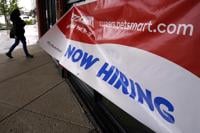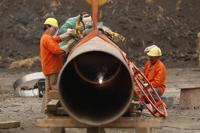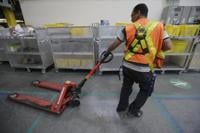The number of Americans filing for unemployment benefits last week rose to its highest level in a year-and-a-half, though jobs remain plentiful by historical standards even as companies cut costs as the economy slows.
Applications for jobless aid for the week ending May 6 rose by 22,000 to 264,000, the Labor Department said Thursday. That’s up from the previous week’s 242,000 and is the most since November of 2021. The weekly number of applications is seen as roughly representative of the number of U.S. layoffs.
Many employers appear to have put a premium on retaining workers after some of them were caught short-handed by the rapid post-COVID-19 economic recovery. As a result, most economists don't envision waves of layoffs even if a recession were to strike later this year as many expect.
The four-week moving average of claims, which evens out some of the weekly volatility, rose by 6,000 to 245,250. Analysts have pointed to a sustained increase in the four-week averages as a sign that layoffs are accelerating, but are hedging their bets on whether any spike in layoffs is imminent.
“Our view remains that layoffs will rise less dramatically than normally might occur as companies do all they can to avoid shedding workers who have been incredibly difficult to recruit and retain,” said economist Joshua Shapiro of the financial and economic consulting firm Maria Fiorini Ramirez.
That doesn't mean that more layoffs are not on the way, Shapiro said, but the numbers are likely to be less drastic compared with past economic downturns.
Also, signs of a cooling labor market may induce the Federal Reserve to pause its furious pace of interest rate increases that are being used to cool labor market and inflation, some economists believe.
U.S. employers added a healthy in April, evidence of a labor market still showing surprising resilience. The unemployment rate dipped to 3.4%, matching a 54-year low. But the figures for February and March were recalculated and lowered by 149,000 jobs, potentially signaling that the Fed maneuvers are beginning to become evident.
The government also recently reported that U.S. job openings to the lowest level in nearly two years.
Last week, the Fed raised its benchmark interest rate . One of the Fed’s goals in raising interest 10 times in the past 14 months is to cool the job market and stifle rising wages. Until very recently, there was very little evidence the central bank’s actions were working on the labor market.
The Fed is hoping to achieve a soft landing — lowering growth just enough to bring inflation under control without causing a recession. Economists are skeptical, with many expecting the U.S. to enter a recession later this year.
Last month, the Commerce Department reported that U.S. economy slowed sharply from January through March as higher interest rates hammered the housing market and businesses reduced inventories.
There have been an increasing number of high-profile layoffs recently, , where companies added jobs at a furious pace during the pandemic. IBM, Microsoft, Salesforce, Twitter, Lyft and DoorDash have all announced layoffs in recent months. Amazon and Facebook have each announced two sets of job cuts since November.
But it’s not just the tech sector that’s trimming staff. McDonald’s, Morgan Stanley and 3M also announced layoffs recently.
For the week of April 29, the total number of Americans collecting unemployment benefits rose by 12,000 from the previous week to 1.81 million.







































